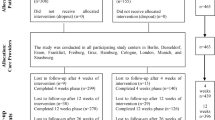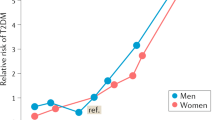Abstract
OBJECTIVE: To investigate the effectiveness of intensive innovative methods for implementing dietary prescriptions on weight management and glycaemic control in overweight men with Type II diabetes.
DESIGN: A randomised clinical trial with a 12-week intervention period — three isocaloric dietary intervention groups (intermittent energy restriction, pre-portioned meals and self-selected meals) each with weekly dietitian contact — and a follow-up visit after 18 months.
SUBJECTS: A total of 51 men with Type II diabetes (mean age 54 y, mean body mass index (BMI) 31.7 kg/m2).
MEASUREMENTS: Weight, body composition, waist circumference, glycaemic control (HbA1c) and blood lipids.
RESULTS: For all subjects, intensive diet therapy over the 12-week intervention period resulted in a mean reduction in energy intake of 2360±2780 kJ/day (564±665 kcal/day) and significant reductions in weight (6.4±4.6 kg), waist circumference (8.1±4.6 cm), percent body fat (1.9±1.5%), HbA1c (1.0±1.4%) and triglyceride levels (0.3±0.6 mmol/l) compared to baseline levels. Intervention group did not affect clinical outcomes, with the exception of percent body fat. A total of 27 (52.9%) subjects attended the 18-month follow-up visit. At this visit, none of the improvements in clinical parameters was maintained, with all parameters returning to preintervention levels.
CONCLUSIONS: A dietary prescription of 6000–7000 kJ/day (1400–1700 kcal/day) was effective in achieving a 6% weight loss and improving glycaemic control. The method of implementation made no difference to the outcomes between groups at 12 weeks or 18 months. Thus, we propose that it was the intensive weekly contact with a health professional in combination with moderate energy restriction that facilitated the successful short-term results seen.
This is a preview of subscription content, access via your institution
Access options
Subscribe to this journal
Receive 12 print issues and online access
$259.00 per year
only $21.58 per issue
Buy this article
- Purchase on Springer Link
- Instant access to full article PDF
Prices may be subject to local taxes which are calculated during checkout
Similar content being viewed by others
References
Maggio C, Pi-Sunyer F . The prevention and treatment of obesity: application to Type 2 diabetes. Diabetes Care 1997; 20: 1744–1766.
Wing RR, Jeffery RW . Effect of modest weight loss on changes in cardiovascular risk factors: are there differences between men and women or between weight loss and maintenance? Int J Obes Relat Metab Disord 1995; 19: 67–73.
Manning RM, Jung RT, Leese GP, Newton RW . The comparison of four weight reduction strategies aimed at overweight patients with diabetes mellitus: four-year follow-up. Diabetes Med 1998; 15: 497–502.
National Heart Lung Blood Institute. Clinical guidelines on the identification, evaluation and treatment of overweight and obesity. National Institute of Health: Washington, DC; 1998.
Heilbronn LK, Noakes M, Clifton PM . Effect of energy restriction, weight loss, and diet composition on plasma lipids and glucose in patients with Type 2 diabetes. Diabetes Care 1999; 22: 889–895.
Williams KV, Mullen ML, Kelley DE, Wing RR . The effect of short periods of caloric restriction on weight loss and glycemic control in Type 2 diabetes. Diabetes Care 1998; 21: 2–8.
Wing RR, Marcus MD, Salata R, Epstein LH, Miaskiewicz S, Blair EH . Effects of a very-low-calorie diet on long-term glycemic control in obese Type 2 diabetic subjects. Arch Intern Med 1991; 151: 1334–1340.
Wing RR, Blair E, Marcus M, Epstein LH, Harvey J . Year-long weight loss treatment for obese patients with type II diabetes: does including an intermittent very-low-calorie diet improve outcome? Am J Med 1994; 97: 354–362.
Anderson JW, Konz EC, Frederich RC, Wood CL . Long-term weight loss maintenance: a meta-analysis of US studies. Am J Clin Nutr 2001; 74: 579–584.
Saris WH . Very low calorie diets and sustained weight loss. Obes Res 2001; 9: 295S–301S.
American Diabetes Association. Evidence-based nutrition principles and recommendations for the treatment and prevention of diabetes and related complications (Position Statement). Diabetes Care 2002; 25: S50–S60.
Crawford D, Jeffery RW, French SA . Can anyone successfully control their weight? Findings of a three year community-based study of men and women. Int J Obes Relat Metab Discord 2000; 24: 1107–1110.
Sugiuchi H, Uji Y, Uekama K, Kayahara N . Direct measurement of high density lipoprotein cholesterol in serum with polyethylene glycol-modified enzymes and sulphated alpha-cyclodextrin. Clin Chem 1995; 41: 717–723.
Friedewald W, Levy R, Fredrickson R . Estimation of the concentration of low density lipoprotein cholesterol in plasma without use of the ultracentrifuge. Clin Chem 1972; 18: 449–502.
Hannan-Jones M . Validation of a food behaviour questionnaire for male Blue collar workers. Master of Health Science thesis, Queensland University of Technology, Brisbane; 1994.
Franz MJ, Horton Sr ES, Bantle JP, Beebe CA, Brunzell JD, Coulston AM, Henry RR, Hoogwerf BJ, Stacpoole PW . Nutrition principles for the management of diabetes and related complications. Diabetes Care 1994; 17: 490–518.
American Diabetes Association. Implications of the United Kingdom Prospective Diabetes Study (Position Statement). Diabetes Care 2002; 25: S28–S32.
UKPDS. Intensive blood-glucose control with sulphonylureas or insulin compared with conventional treatment and risk of complications in patients with Type 2 diabetes (UKPDS 33). Lancet 1998; 352: 837–853.
Baum JG, Clark HB, Sandler J . Preventing relapse in obesity through post treatment maintenance systems: comparing the relative efficacy of two levels of therapist support. J Behav Med 1991; 14: 287–302.
Glenny AM, O'Meara S, Melville A, Sheldon TA, Wilson C . The treatment and prevention of obesity: a systematic review of the literature. Int J Obes Relat Metab Disord 1997; 21: 715–737.
Ditschuneit HH, Flechtner-Mors M, Johnson TD, Adler G . Metabolic and weight-loss effects of a long-term dietary intervention in obese patients. Am J Clin Nutr 1999; 69: 198–204.
Wing RR, Jeffery RW . Food provision as a strategy to promote weight loss. Obes Res 2001; 9: 271S–275S.
Thompson RL, Summerbell CD, Hooper L, Higgins JPT, Little PS, Talbot D, Ebrahim S . Dietary advice given by a dietitian versus other health professional or self-help resources to reduce blood cholesterol (Cochrane Review). In: The Cochrane Library, Issue 4 Update Software: Oxford; 2002.
Franz MJ, Bantle JP, Beebe CA, Brunzell JD, Chiasson JL, Garg A, Holzmeister LA, Hoogwerf B, Mayer-Davis E, Mooradian AD, Purnell JQ, Wheeler M . Evidence-based nutrition principles and recommendations for the treatment and prevention of diabetes and related complications. Diabetes Care 2002; 25: 148–198.
Acknowledgements
This research was supported by the Princess Alexandra Hospital Research and Development Foundation Grant, Novartis Ltd, Mitchell Foods and the Department of Diabetes and Endocrinology, Princess Alexandra Hospital. This study was presented in abstract form at the Nutrition Week Conference, San Diego, California, February 2002.
Author information
Authors and Affiliations
Corresponding author
Rights and permissions
About this article
Cite this article
Ash, S., Reeves, M., Yeo, S. et al. Effect of intensive dietetic interventions on weight and glycaemic control in overweight men with Type II diabetes: a randomised trial. Int J Obes 27, 797–802 (2003). https://doi.org/10.1038/sj.ijo.0802295
Received:
Revised:
Accepted:
Published:
Issue Date:
DOI: https://doi.org/10.1038/sj.ijo.0802295
Keywords
This article is cited by
-
Effect of Fasting-Mimicking Diet or Continuous Energy Restriction on Weight Loss, Body Composition, and Appetite-Regulating Hormones Among Metabolically Healthy Women with Obesity: a Randomized Controlled, Parallel Trial
Obesity Surgery (2021)
-
Effects of intermittent versus continuous dieting on weight and body composition in obese and overweight people: a systematic review and meta-analysis of randomized controlled trials
International Journal of Obesity (2019)
-
Intermittent energy restriction and weight loss: a systematic review
European Journal of Clinical Nutrition (2016)
-
Metabolic Effects of Bariatric Surgery: A Focus on Inflammation and Diabetic Kidney Disease
Current Obesity Reports (2013)
-
The effects of intermittent or continuous energy restriction on weight loss and metabolic disease risk markers: a randomized trial in young overweight women
International Journal of Obesity (2011)



